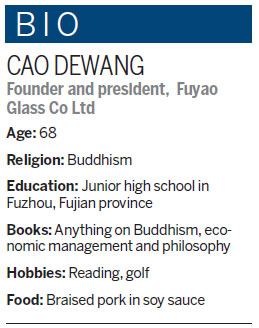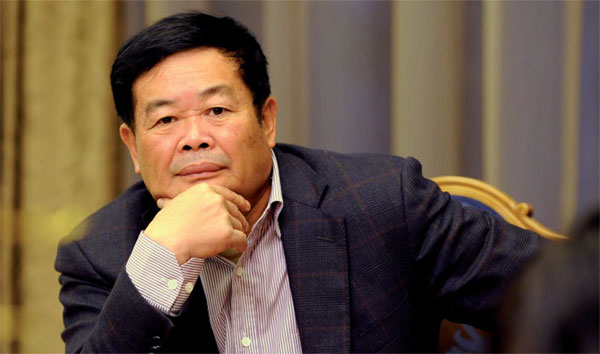Glass always full for Buddhist executive
Updated: 2014-12-19 09:10
By Hu Haiyan, Hu Meidong and Sun Li(China Daily Europe)
|
|||||||||||
Business pioneer brings his principles to bear as company walks with destiny
An expensive business school would probably call it the SIP principle, those letters standing for sincerity, integrity and persistence. But gimmicky, management-speak labels are not for Cao Dewang, and the Chinese business pioneer is happy to let actions speak for themselves.
It is sincerity, integrity and persistence that have helped put Fuyao Group where it is today, says Cao, whose autobiography in Chinese, Xin Ru Pu Ti, (My heart is a bodhi tree) was published on Dec 17.
|
Cao Dewang, chairman of Fuyao Glass Industry Group, says Chinese companies that want to go global need to look into what kind of overseas business expansion strategy is best for them. Provided to China Daily |
"As long as you abide by international rules, honor transparency, compete fairly and have a clear understanding of the target market, the international market can propel the growth of Chinese companies," says Cao, chairman of Fuyao Glass Industry Group Co Ltd.
Cao knows a thing or two about "international rules", having become a celebrated figure in the Chinese business world by successfully fighting anti-dumping cases in the United States and Canada.
When talk turns to whether the global market differs greatly from that of China, Cao becomes animated and rejects the proposition with a firm "No" in English.
"For me the biggest challenge lies in the language; I cannot speak English. There are also challenges such as a lack of people with the proper international management expertise. But getting into overseas markets is not as difficult as some people imagine."
The leader of the world's largest automotive glass maker by sales says more and more Chinese companies will eventually be developing their business overseas.

"For example, profits are shrinking domestically, labor costs are rising and high taxes and electricity charges all pose challenges for us. As the world becomes more globalized, every Chinese entrepreneur needs to grow their company into a global enterprise.
"Chinese companies that want to go global need to look into what kind of overseas business expansion strategy is best for them."
Cao, speaking in his sprawling two-story home in the suburbs of Fuzhou, capital of Fujian province, says: "There are certain things that need to be weighed very carefully before a Chinese company goes global. First of all, what part of the business are you going to make global? The capital, products or technology? Second, where is the destination? The Middle East or the US or Europe? Third, why is it that this destination appeals to you? Fourth, are you familiar with the target countries' or regions' politics and cultural environment? Last but not least, will they be welcome in the market they want to go to?"
Cao, 68, a committed Buddhist, says he loves reading books about the religion, and his house's reading room is full of classical Buddhist books. The traits of sincerity, integrity and persistence that led him to set up the Fuyao Group and make it what it is today are cornerstones of Buddhism, he says.
Fuyao was founded in 1987 in Fuqing county, Fuzhou, and now employs more than 20,000 people worldwide. It had about 20 percent of the global market for automotive glass last year, with revenue of 11.5 billion yuan ($1.86 billion, 1.49 billion euros), 12.2 percent higher than in the previous year.
The group pulled in revenue of 3.67 billion yuan outside China last year, about 10 percent higher than the year before, and sales outside China accounted for 31.87 percent of the total.
The group's profit was 1.91 billion yuan last year, 25.8 percent higher than in the previous year.
Cao attributes the good performance to the group's focus on overseas expansion and to its technological innovation. It made its first overseas foray in 1995 when it set up an automotive glass factory in the US state of South Carolina.
Its glass is now sold in 61 countries and regions, and Fuyao is an approved original equipment manufacturer for many global carmakers, including Audi, Ford, GM and Volvo.
Fuyao says he expects strong overseas sales growth in the years to come, with the United States, Russia and Europe leading the way.
"We expect that by the end of 2016, the US market will become our largest overseas market, and that we will have invested as much as $600 million there."
Investment in the US now stands at $400 million, much of that in a manufacturing operation in the state of Ohio.
Last year the company spent $200 million building a factory in Russia that is expected to produce 1 million units of glass a year. That will supply the Russian market and Eastern Europe, a region increasingly expanding amid the European debt crisis, Cao says.
"Our overseas sales are mainly in Asia and North America, but Europe is now becoming a major market. Fuyao is the exclusive supplier for Volvo and the largest supplier to Volkswagen. In Europe, for example Germany, we see huge potential."
Fuyao's overseas expansion will proceed step by step, he says.
"The US is the first target, and then Europe. We now have factories in Germany, and offices in Britain, Italy and Sweden. We will go deeper into Europe once we have built ourselves up in the US."
Cao is a keen player of golf, which he says he starts early - as early as 5 am.
"Many people play golf as a social activity, but I do it for the exercise. The thing about playing in the early morning is that because no one else is playing, you can take your time."
Getting up early is a habit cultivated in his childhood, he says.
Born to poor parents in Fuqing, Fuzhou, Cao says that when he was young his diet consisted of two small meals a day. He left school when he was 14 and one of his first jobs was getting up at 3 am every day to sell fruit.
"It was when I was young that I learned to live with hardship."
He made his first fortune when he was in his 20s after plunging his savings into a glass company that at the time was losing money. He turned it into a profit maker, and in 1987, with friends, he set up the Fuyao Group, making automotive glass. The original idea was to make glass just for the Chinese market, he says, and later the company's horizons expanded.
While building sales outside China is a top priority, Fuyao still regards the domestic market as its backbone, he says.
"Domestic and overseas markets are both important to us. Demand in the local market continues to grow, and for Chinese there is a growing trend to buy a new car every four or five years."
Fuyao has four research and development centers, in Fujian, Shanghai, Germany and the US, to meet the development requirements of top global OEMs. Each year the company spends about 5 percent of its revenue in research and development, Cao says.
Fuyao is also a pioneer in corporate governance, from restructuring the company as one of the first joint-stock limited companies in Fujian province, to being one of the first companies in China to introduce independent directors to its board.
Cao says that as a Buddhist, any plans he has for overseas expansion are not set in stone; rather, it all depends on "destiny", he says.
He is well known in China for his philanthropy, something that has won him international recognition. Since 1983 he has donated about 6 billion yuan to various causes. In 2011 he donated 3.6 billion yuan from his personal stock in Fuyao Group to Heren Charitable Foundation, which is named after his father. It is the largest charitable foundation in China. It provides financial backing for education, healthcare and other projects that aim to help the less well-off in impoverished regions of the country.
"China lags the US in how charity has developed," he says. "There are about 2 million philanthropic groups in the US, but just tens of thousands in China."
He has also gained international recognition for his business acumen, being named Ernst & Young World Entrepreneur of the Year in Monte Carlo in 2009.
As Cao points to the trophy he won on that occasion, the uncertainties of the destiny he mentioned earlier seem to vanish, and he says: "Given Fuyao's research and development strength and the strong domestic market... our growth overseas will continue."
Contact the writers through huhaiyan@chinadaily.com.cn
( China Daily European Weekly 12/19/2014 page21)
Today's Top News
China set to make tracks for Europe
Global net tightened in hunt for Chinese fugitives
Russians flock to stores to pre-empt price rises
Wong Kar-wai: Timeless director who makes time wait
China pledges $3b investment for Europe
Obama to sign Russia sanctions bill, White House says
Beijing condemns Pakistan school attack
Wolfsburg signs China midfielder for 2 1/2 years
Hot Topics
Lunar probe , China growth forecasts, Emission rules get tougher, China seen through 'colored lens', International board,
Editor's Picks

|

|

|

|

|

|






